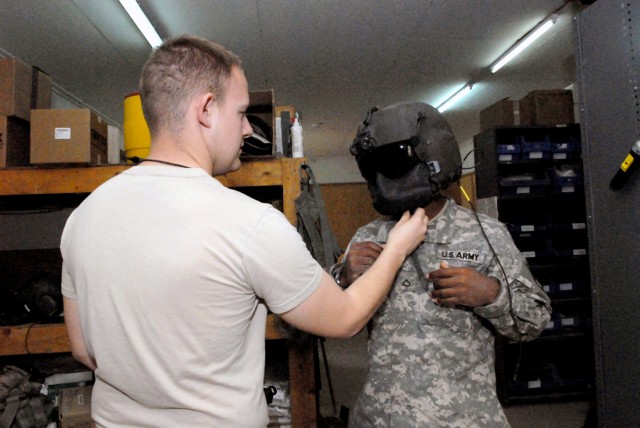
CAMP TAJI, Iraq (Mar. 11, 2008) -- Have you ever been walking and had a small rock get inside your shoe' Remember that sharp, and annoying, discomfort you felt with every step you took' Now imagine having to walk around for hours with that rock in your shoe and not being able to remove it.
An aviator can experience a similar type of pain during a mission if a piece of equipment -- such as a flight helmet -- needs to be fixed or just doesn't fit properly.
The 12th Combat Aviation Brigade's Aviation Life Support Equipment shop is responsible for inspecting and repairing that equipment for aviators in Multi-National Division - Baghdad.
That includes the helmets, the vests and other survival equipment that might be needed if the aircraft had to make an emergency landing.
"The ALSE shop takes care of personal equipment that a flight crew member, regardless whether or not they are rated, will use in the performance of their duties on the aircraft," said Sgt. 1st Class Jeffery Long, quality assurance and production control NCO for the 12th's Company D, 5th Battalion, 158th Aviation.
"If a crew member has a helmet that doesn't fit right, or is just uncomfortable, flying around for hours with it on can be unbelievably painful, and after a while that helmet can give them a sore spot on their head," said Sgt. David Shafer, NCO-in-charge of the ALSE shop. "That bad helmet could also fail to protect the pilot during an in-flight emergency."
In addition to inspecting and servicing flight gear, the ALSE shop is responsible for regularly inspecting safety equipment such as seat belts, fire extinguishers and first aid kits.
The ALSE shops here and at Logistical Support Area Anaconda in Balad are responsible for maintaining this equipment for nearly 500 aviators.
"We usually check the seat belts and fire extinguisher every 60 to 90 days, and we usually do scheduled maintenance on the helmets and vest every 180 days," said Shafer. "But in the event something breaks or needs to be serviced immediately, we'll take the item and try to have it ready to go as soon as possible."
"I think those guys do an awesome job and their turnaround time is unbelievably fast," said Long. "They could definitely ask for more time to service the equipment, but they know how important that gear is to the mission. They work overtime to get those aviators back in the air with equipment that works."
"Without the ALSE shop, we couldn't continue to fly the way we do and be safe," said Sgt. Christopher Zedan, a crew chief in Company A, 5th Battalion, 158th Aviation. "They do a great job keeping our equipment up to standard and working the way it should."
The Soldiers of the ALSE shop also show crew members the proper way to use the gear.
"We give them the basic class on how to use the equipment and how to perform preventative maintenance checks and services on the gear," said Shafer. "This class is especially helpful to those Soldiers who have been recently cross-trained as door gunners, because many of them have had little interaction with aviation equipment."
During those classes, Shafer also tries to give lessons in survival, evasion, resistance and escape tactics some of the aviators may have forgotten.
"We teach them how to egress from the aircraft when they land on water and when the aircraft is underwater," he said. "I also show them cool things like how to take Vaseline gauzes and make a small stove that can provide enough heat to keep a cockpit warm for several hours."
Currently there is no specific military occupational specialty for Soldiers who work in ALSE shops, although they train at the Army's Aviation and Warfighting Center at Fort Rucker, Ala., for several weeks and take additional courses to keep themselves up-to-date on equipment changes, said Long.
"It's our job is to provide these aviators equipment that is up-to-date and can save their life in an emergency," said Shafer.
The 12th CAB is a U.S. Army Europe unit headquartered in Ansbach, Germany.

Social Sharing